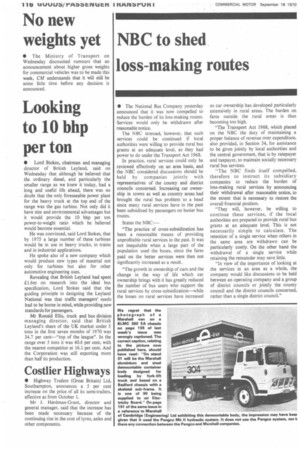NBC to shed loss-making routes
Page 118

If you've noticed an error in this article please click here to report it so we can fix it.
• The National Bus Company yesterday announced that it was now compelled to reduce the burden of its loss-making routes. Services would only he withdrawn after reasonable notice.
The NBC stressed, however, that such services could be continued if local authorities were willing to provide rural bus grants at an adequate level, as they had power to do under the Transport Act 1968.
In practice, rural services could only be reviewed effectively on an area basis, and the NBC considered discussions should be held by companies jointly with representatives of the county and district councils concerned. Increasing ear ownership in towns as well as country areas had brought the rural bus problem to a head since many rural services have in the past been subsidized by passengers on busier bus routes.
States the NBC:— "The practice of cross-subsidization has been a reasonable means of providing unprofitable rural services in the past. It was not inequitable when a large part of the population used the buses, since the fares paid on the better services were then not significantly increased as a result.
"The growth in ownership of cars and the change in the way of life which car ownership brings with it has greatly reduced the number of bus users who support the rural services by cross-subsidization—while the losses on rural services have increased as car ownership has developed particularly extensively in rural areas. The burden on fares outside the rural areas is thus becoming too high.
"The Transport Act 1968, which placed on the NBC the duty of maintaining a proper balance of revenue over expenditure, also provided, in Section 34, for assistance to be given jointly by local authorities and the central government, that is by ratepayer and taxpayer, to maintain socially necessary rural bus services.
"The NBC finds itself compelled, therefore to instruct its subsidiary companies to reduce the burden of loss-making rural services by announcing their withdrawal after reasonable notice, to the extent that is necessary to restore the overall financial position.
"They will, however, be willing to continue these services, if the local authorities are prepared to provide rural bus grants at an adequate level. This is not necessarily simple to calculate. The retention of a single service when others in the same area are withdrawn can be particularly costly. On the other hand the withdrawal of a single service while retaining the remainder may save little.
"In view of the importance of looking at the services in an area as a whole, the company would like discussions to be held between an operating company and a group of district councils or jointly the county council and the district councils concerned, rather than a single district council."






























































































































































































































































































































































































